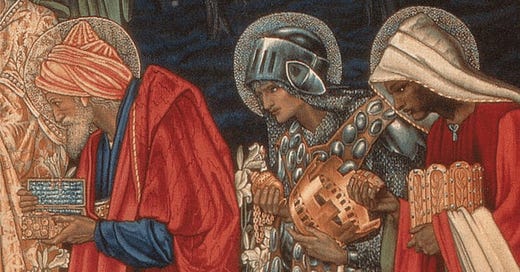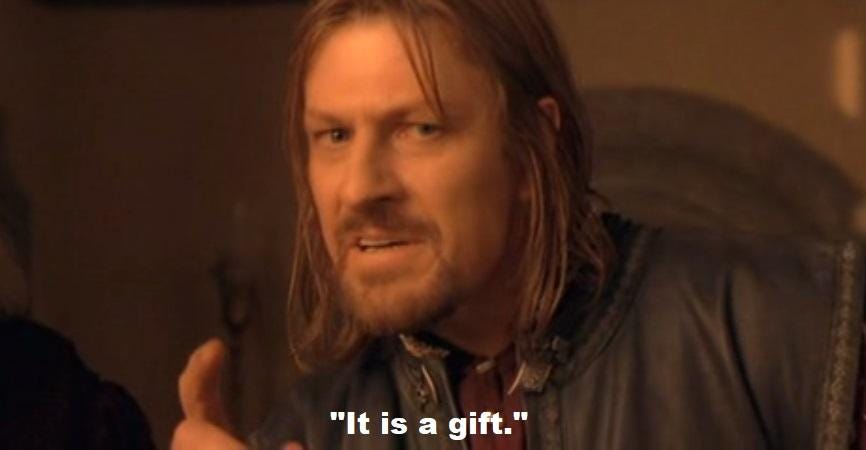Reminder: my giveaway of a copy of The Hobbit illustrated by Alan Lee is open through the end of the day tomorrow, January 6th. Subscribe to this Substack for free, follow me on Instagram, and/or share the giveaway on social media (and tag me) for one entry each! Winner will be announced Saturday.
This week, churches all across the world will celebrate the Feast of the Epiphany, (either tomorrow on January 6th or on Sunday depending on your tradition). In the West, this means commemorating the visit of the Magi, or Wise Men, to Jesus and his parents as described in Matthew 2:1-12.
That’s right, they thought the Christmas gifts stopped with the twelve lords a leaping on the twelfth day of Christmas, but they were—all of them—deceived, for another set of gifts was given. For on the 13th day of Christmas, when we remember the visit of the Wise Men we also remember the gifts of the Magi. No, not those gifts of the Magi—no pocket watch chain or set of combs for baby Jesus (though he would be equally unable to use them!). It is their gifts of gold, frankincense, and myrrh that we remember.
Gifts are something of a minor recurring theme in Tolkien’s legendarium. Ilúvatar himself gives his younger children, the race of men, the gift1 of mortality. In the Second Age, Sauron disguises himself in a fair form and gives himself the name Annatar, which means ‘Lord of Gifts,’ while he attempts to sway the elves in Middle-earth to his side. Sméagol demands the One Ring as a birthday gift from his cousin Déagol. Bilbo gifts both Sting and his mithril shirt to Frodo, the latter of which was itself a gift to Bilbo from Thorin. Galadriel gives gifts to the members of the Fellowship upon their departure from Lothlórien. And who could forget this moment from one of the most memeable scenes in the entire film trilogy:
But to know the true meaning of the gift it is often necessary to know something of the giver of the gifts as well as something about the recipient. Ilúvatar’s gift of death to men, for instance, is famously difficult to rightly interpret—how can death and not being bound to this plane of existence be a good gift? Knowing more about Ilúvatar as well as the race of men, especially compared with the elves and their fate, gives some crucial keys to understanding how it could be so. Sauron’s gifts to the elves of knowledge and friendship while he was disguised as Annatar were deceptive just as their giver was deceptive, both concealing ulterior motives and hiding evil intentions behind fair appearance. Sméagol’s ‘birthday gift’ is no gift at all, and though Boromir was right that the Ring falling into the hands of Frodo is a gift to the Free Peoples of Middle-earth he was very wrong about how to use such a gift.
Galadriel’s gift in particular of three strands of her hair to Gimli is a gift whose true significance remains obscured unless you know the history told in The Silmarillion of Fëanor’s quest to craft the eponymous Silmarils. Desiring to use Galadriel’s hair, which shone gold and silver with the very light of the Two Trees of Valinor, in crafting the Silmarils, three times he begs her for some of her hair. Three times Galadriel refuses him a single strand. And yet thousands of years later she gives this very gift not to just anyone else but to a dwarf, whose people have had bitter blood with elves for centuries? This was a kingly gift indeed, shocking to those who were aware of her history with Fëanor and functioning as a significant pledge of goodwill between the feuding peoples.
Just as Galadriel’s gift to Gimli has a hidden, greater significance than is readily apparent at first glance, so too many throughout history have looked for symbolic meanings of the gifts that the Wise Men brought to Jesus.
Keep reading with a 7-day free trial
Subscribe to Jokien with Tolkien to keep reading this post and get 7 days of free access to the full post archives.






